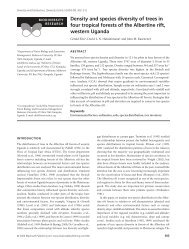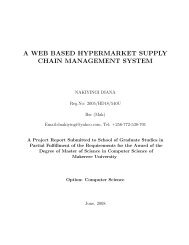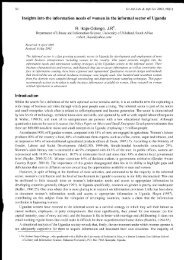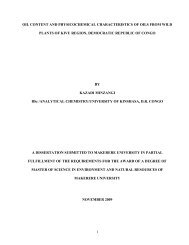THE UNIVERSITY OF LEIPZIG
THE UNIVERSITY OF LEIPZIG
THE UNIVERSITY OF LEIPZIG
Create successful ePaper yourself
Turn your PDF publications into a flip-book with our unique Google optimized e-Paper software.
plants, animals and their natural history. 658 Local ecological knowledge also involves studying<br />
of peoples’ traditional lifestyles which in a way offers many lessons in the management of<br />
resources, particularly in forestry ecosystems.<br />
Capta observed that ecosystems sustain themselves in a dynamic balance based on cycles and<br />
fluctuations in a non-linear process. 659 Therefore, talking about traditional ecological<br />
knowledge involves the ecological awareness that arises when we combine rational<br />
knowledge with intuitive wisdom. This is characteristic of traditional non-literate culture. In<br />
this sub-section we wish to investigate the role of traditional knowledge in shaping<br />
biodiversity resource management institutions. For instance, what shapes the varied<br />
interpretations of different tree and animal species in and around Kakamega forest? How<br />
relevant is it to compare these interpretations with those given by the national forest<br />
conservatory services?<br />
Local ecological knowledge models followed by the people around Kakamega forest are<br />
buttressed in Luhya old traditions regarding this bio-region. 660 The local ecological<br />
knowledge surrounding the forest has in many ways continues to evolve. Observations and<br />
experiences continue to be accumulated through generations. It was striking to note that local<br />
directories used to document various plants and animals species, contained many more<br />
species that did not appear in some of the recent national forest directories. On the contrary<br />
the people living around these forests argued that these plant and animal species have been<br />
seen for decades.<br />
It is further imperative to note that, the local population is knowledgeable about the species<br />
that are threatened and facing extinction, yet the forest management service is not. While in<br />
practice the local population was more conversant with the informal local ecological<br />
knowledge in these localities, they have a faint grasp of the trend and scientifically related<br />
discussions regarding the natural biota in their region. Similarly, they had no clear<br />
comprehension of the formal legal regimes regarding the national biodiversity laws. This<br />
discrepancy may be useful in exploring the chronic conflict between the local communities<br />
and the forest wardens especially in areas of Shinyalu and Kaimosi among others.<br />
It is therefore logical to ask whether if the local ecological knowledge model used by the<br />
people around the Kakamega forest if well interpreted can be useful in shaping peoples’<br />
knowledge regarding the current formal biodiversity resource management regime used in<br />
Kakamega and other forests. Although this postulation may require further scrutiny, evidence<br />
of strong local ecological knowledge obtained from the Tiriki and Bunyala shows that the<br />
behaviours of the local population towards the forest in these areas is quite different, yet there<br />
is minimal supervision and control especially by the forest wardens. In an opinion interview<br />
658<br />
Gilchrist, G. and M. L,Mallory. 2007. Comparing Expert-based Science with Local Ecological Knowledge:<br />
What are we afraid of? Ecology and Society 12(1):r1.<br />
659<br />
Capta, G. 1995. Ecology, Diversity and Diversity of the Middle Grande Basin. A Report of the United States<br />
Department of Agriculture.<br />
660<br />
Jungerius, P.D. 2004. Indeginous Knowledge of Landscape: Ecological Zones Among Traditional Herbalists.<br />
A case Study in Keiyo District , Kenya Geo Journal 44 (1):55-60<br />
162






